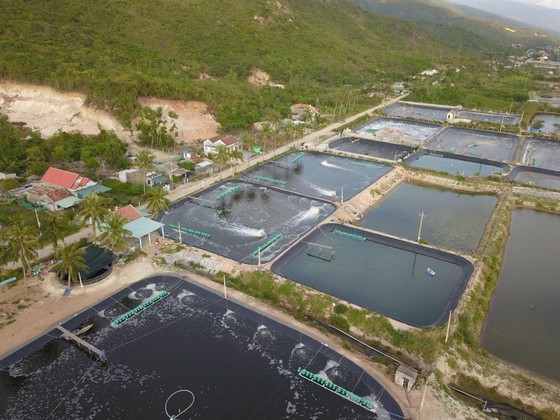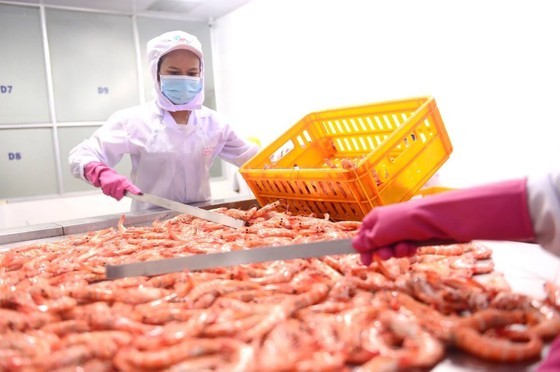 |
Shrimp farming area for export in Ninh Hoa Town of Khanh Hoa Province (Photo: SGGP) |
The Trade Remedies Authority (Ministry of Industry and Trade) has informed about the recent lawsuit notice against warm-water shrimps imported to the US from Vietnam. Due to a large number of direct subsidy programs that they are enjoying (e.g. corporate income tax incentives, exemption of receivables, land rent exemption and reduction incentives export promotion and investment support programs, agricultural insurance premium support), these products are severely harming the domestic shrimp production industry there.
In October 2023, the Department of Commerce of the US, Turkey, and Indonesia carried out trade defense investigations on a quantity of imported merchandise from Vietnam like the anti-dumping one on extruded aluminium and products from imported aluminium, welding wire products made of base metals, and on textile products.
Chairman Vu Duc Giang of the Vietnam Textile and Apparel Association commented that domestic exporting companies are now facing not only trade defense lawsuits but also green trade barriers imposed by international markets such as regulations on greening manufacturing procedures, reducing fossil fuel consumption, recycling production waste, and using eco-friendly materials.
“Since the beginning of this year, over 3,000 textile enterprises in Vietnam have had to close as they could not satisfy requirements on greening their manufacturing process. Even large-scale companies find trouble upgrading their production technologies while handling their orders. This means the new rules in the export market are extremely harsh”, said General Director Pham Van Viet of Viet Thang Jeans Co. Ltd.
To better adapt to the new situation, the Ministry of Industry and Trade has directed the Trade Remedies Authority to closely monitor the markets and timely provide requested documents to the nations carrying out trade defense investigations.
Deputy Minister of Industry and Trade Do Thang Hai shared that many businesses have not been well-prepared for such lawsuits, nor have they stored sufficient legal documents for their manufacturing process, leading to their passiveness when being sued. As a result, an extremely high rate of trade defense tax of up to 400 percent has been imposed on certain merchandise.
The good news is many companies are now better prepared, with their own judicial departments to specifically take care of such situations, and win the game to escape that tax.
 |
Shrimp processing at a seafood business (Photo: SGGP) |
Chairwoman of LNS International Corporation Nguyen Thi Kim Huyen commented that Vietnamese products when entering the markets of the US or European nations have encountered various obstacles, stemming from low price competitiveness. A long geographical distance leads to disadvantages of shipping time and cost, not to mention difficulties in product preservation, especially agricultural merchandise with no artificial preservatives.
To successfully export Vietnamese products, businesses have to ensure standard packaging with sufficient information on nutritional ingredients in the target language, along with warning information about products if any.
As to state management on this matter, many companies voiced that the tardiness in launching the national e-commerce trading floor is the main reason why domestic businesses lose valuable opportunities to expand their market. They themselves have to seek ways to connect to renowned e-commerce trading floors like Amazon, TikTok, or Walmart for their own channel there. But these are not formal national ones, leading to trouble in authenticating brand names and limited chances to approach potential customers worldwide.
“The purchasing trend of global partners at present is through e-commerce trading floors. Hence, the earlier the national trading floor is introduced, the more effective it is to help domestic companies to increase their export market share”, said General Director Pham Van Viet.
In related news, on November 27, the Ministry of Industry and Trade organized the Vietnam-EU Trade Forum under the theme ‘Sustainability – the Pathway to Create Future Value Chains’. Head Ta Hoang Linh of the European-American Market Department (under the Industry and Trade Ministry) shared that exporting goods to European markets is becoming more challenging due to new technical barriers.
Such important regulations as the Border Carbon Adjustment Mechanism (CBAM), EU Deforestation Regulation (EUDR), and the Corporate Sustainability Due Diligence Directive (CSDDD) will have significant impacts on trading activities between Vietnamese businesses and their EU counterparts. Drastic adaptation measures must be applied for domestic companies to survive there.
























